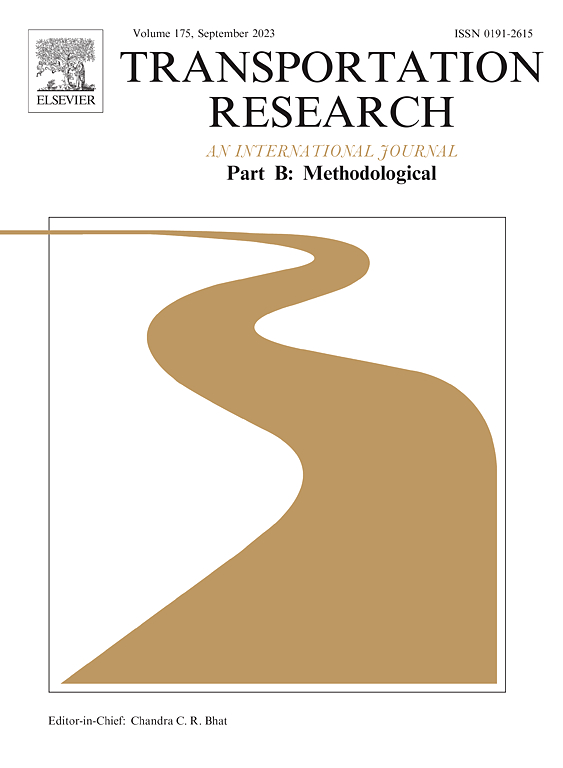Preference heterogeneity in a dynamic flow congestion model
IF 6.3
1区 工程技术
Q1 ECONOMICS
引用次数: 0
Abstract
The bottleneck model has dominated the field on dynamic congestion, as it is tractable and has closed-form solutions. But it has rather specific outcomes that do not occur in most other dynamic models or under static congestion. In the bottleneck model, pricing can remove all travel delays while keeping the generalized price unchanged, making pricing much more beneficial than in other models. Thus, it is important to see how pricing performs in other models. We do so by adding discrete preference heterogeneity to a dynamic flow congestion model, and we study the efficiency and distributional effects of pricing. By formulating a multi-point optimal-control problem using Hamiltonians, we derive the social optimum and analyze the properties of travel equilibrium. Solving our model is more complex than solving the bottleneck model, but still results in closed-from solutions, whereas most other dynamic congestion models have no such solutions. Without tolling, the arrival order is determined by the ratio of the value of time (VOT) to the value of schedule delay, as in the bottleneck model. However, unlike the bottleneck model, the same holds for the social optimum when only the VOT differs across users (as tolling cannot eliminate all travel time delays). In our model, users with a lower VOT always lose from tolling, while those with a higher VOT may gain or lose, depending on the parameters. Compared to the bottleneck model, tolling is less beneficial for society, lengthens the peak, and hurts users more. Our findings reveal the significance of considering congestion type and preference heterogeneity in assessing the implementation of congestion tolling.
动态流拥塞模型中的偏好异质性
瓶颈模型以其易于处理和具有封闭解的特点在动态拥塞研究领域占据主导地位。但它有相当具体的结果,不会发生在大多数其他动态模型或静态拥塞。在瓶颈模型中,定价可以在保持广义价格不变的情况下消除所有出行延迟,使得定价比其他模型更有利。因此,了解定价在其他模型中的表现是很重要的。我们通过将离散偏好异质性添加到动态流量拥塞模型中来研究定价的效率和分配效应。利用哈密顿量构造了一个多点最优控制问题,导出了社会最优解,并分析了旅行均衡的性质。求解我们的模型比求解瓶颈模型更复杂,但仍然会得到封闭的解,而大多数其他动态拥塞模型都没有这样的解。在不收费的情况下,到达顺序由时间值(VOT)与调度延迟值的比值决定,如瓶颈模型中所示。然而,与瓶颈模型不同的是,当用户之间的VOT不同时,社会最优也是如此(因为收费不能消除所有的旅行时间延迟)。在我们的模型中,具有较低VOT的用户总是因收费而损失,而具有较高VOT的用户可能因收费而获利或损失,这取决于参数。与瓶颈模型相比,收费对社会的好处更小,延长了高峰期,对用户的伤害更大。我们的研究结果揭示了在评估拥堵收费实施时考虑拥堵类型和偏好异质性的重要性。
本文章由计算机程序翻译,如有差异,请以英文原文为准。
求助全文
约1分钟内获得全文
求助全文
来源期刊
CiteScore
12.40
自引率
8.80%
发文量
143
审稿时长
14.1 weeks
期刊介绍:
Transportation Research: Part B publishes papers on all methodological aspects of the subject, particularly those that require mathematical analysis. The general theme of the journal is the development and solution of problems that are adequately motivated to deal with important aspects of the design and/or analysis of transportation systems. Areas covered include: traffic flow; design and analysis of transportation networks; control and scheduling; optimization; queuing theory; logistics; supply chains; development and application of statistical, econometric and mathematical models to address transportation problems; cost models; pricing and/or investment; traveler or shipper behavior; cost-benefit methodologies.

 求助内容:
求助内容: 应助结果提醒方式:
应助结果提醒方式:


